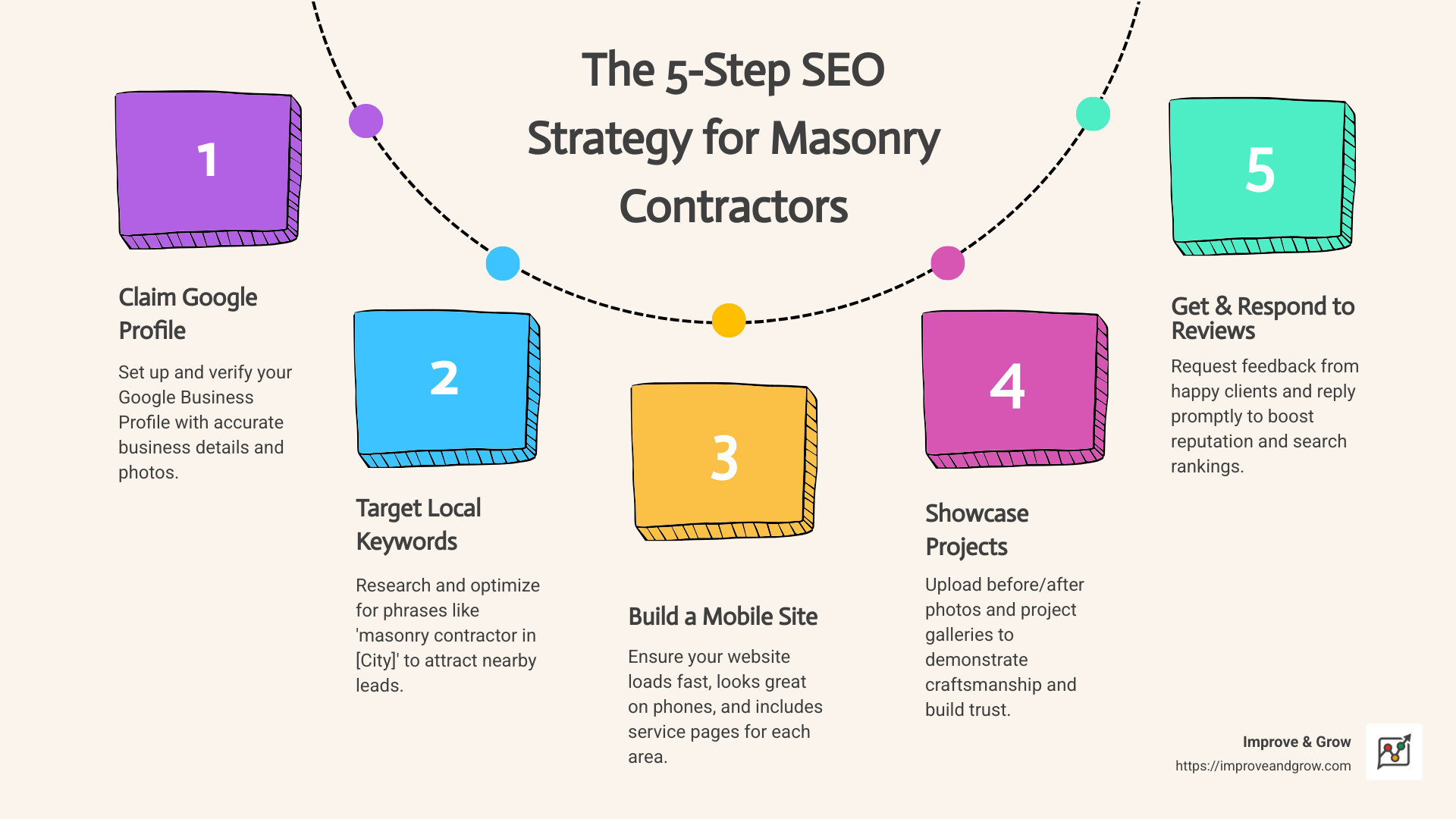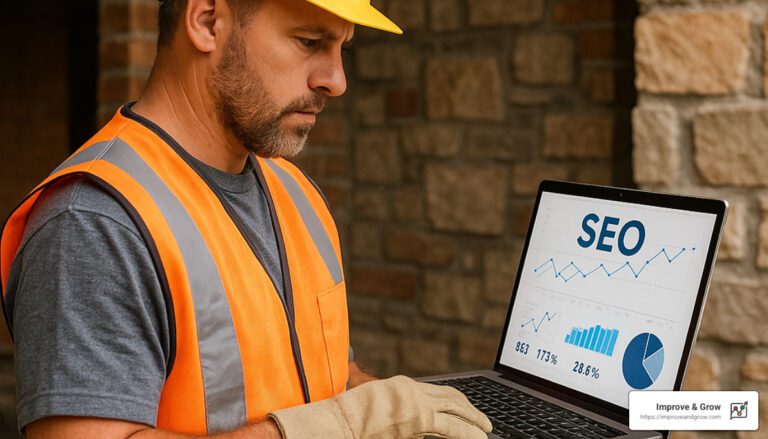SEO for Masonry Contractors: 7 Powerful Ways to Win 2025
Why Masonry Contractors Need Strategic SEO to Grow Their Business
You’ve built your masonry business on skill, craftsmanship, and a solid word-of-mouth reputation. Your stonework speaks for itself—but in today’s digital world, that’s unfortunately no longer enough to keep quality projects flowing through your door.
SEO for masonry contractors isn’t just another marketing buzzword. It’s a specialized approach that transforms your online presence into a lead-generating powerhouse. When done right, it puts your business directly in front of homeowners and builders actively searching for the exact services you provide.
“When homeowners and builders are looking for masonry contractors, they turn to online searches to find reliable services in their area,” explains Scott Rehnberg, SEO & Content Specialist at Improve & Grow. “If your business isn’t properly optimized for these searches, you’re missing out on valuable opportunities.”
The numbers tell a compelling story: over 80% of consumers now use search engines to find local services, and a staggering 95% never venture beyond Google’s first page. With more than 27,000 monthly searches in the United States for masonry-related keywords, there’s a significant opportunity waiting to be tapped.
For masonry professionals, local SEO is particularly valuable. Research shows that 46% of all Google searches have local intent, and the top 3 search results capture 33% of all clicks. Without a strategic approach, those valuable clicks—and the projects that follow—are landing squarely with your competitors.
The foundation of successful SEO for masonry contractors starts with claiming and optimizing your Google Business Profile with accurate name, address, and phone information. From there, you’ll want to target location-specific keywords like “masonry contractor in [City]” that potential customers actually use when searching.
A mobile-friendly website with dedicated service pages showcasing your craftsmanship through high-quality project galleries is essential. And don’t underestimate the power of customer reviews—generating and thoughtfully responding to them significantly boosts your local rankings.
Unlike traditional advertising or third-party lead services, SEO provides compounding value over time. While you’ll typically wait 3-6 months for initial results, with significant improvements appearing within 6-12 months, the investment yields sustainable growth and higher-quality leads that actually convert to paying jobs.

Understanding SEO for Masonry Contractors
When you’re a master at laying brick and stone, the idea of mastering search engines might seem like a completely different skill set. But SEO for masonry contractors isn’t as complicated as it might first appear – it’s simply about making your craftsmanship visible online when potential customers are actively searching for your services.
“Think of SEO for masonry contractors as building a digital foundation for your business,” says Brian Welch, Digital Marketing Strategist at Improve & Grow. “Just like you need quality materials and proper techniques to create lasting masonry work, you need the right SEO elements to build a strong online presence.”
The masonry industry occupies a special place in the home services market, combining both beautiful craftsmanship and essential structural work. This creates unique opportunities for targeting the right keywords and creating content that resonates. Every month, more than 27,000 Americans search specifically for masonry, chimney, and stonework terms – and that’s not even counting the hundreds of thousands of related variations.
When masonry contractors compare SEO to paid advertising like Google Ads, the differences become clear:
| SEO | PPC (Pay-Per-Click) |
|---|---|
| Higher upfront investment | Immediate results |
| Lower long-term cost per lead | Higher ongoing cost per lead |
| Compounds over time | Stops when budget runs out |
| Builds valuable digital assets | Rents visibility temporarily |
| Average 275% ROI | Diminishing returns over time |
What makes masonry marketing unique is the variety in customer search intent. Some homeowners are researching materials or techniques for future projects, while others have an immediate need for repair or construction. A well-rounded SEO for masonry contractors strategy addresses both scenarios, capturing potential clients at every stage of their journey.
Why SEO for Masonry Contractors Matters
The numbers tell a compelling story about why masonry professionals need to prioritize their online presence. SEO drives high-quality leads from people actively searching for your specific services, resulting in better conversion rates and higher-value projects. In fact, 81% of consumers research online before making decisions about local services.
When it comes to search results, position matters tremendously. The top three results receive about 33% of all clicks, with the #1 position alone capturing nearly 40% of clicks. Unlike paid advertising that disappears when you stop paying, SEO continues delivering results long after your initial investment, creating sustainable growth for your masonry business.
Perhaps most importantly, high search rankings serve as powerful trust signals for potential clients. When your business appears at the top of search results, it suggests you’re established and reputable – critical factors when homeowners are choosing someone to work on their property.
“For masonry contractors, local SEO isn’t just about being found—it’s about being found by the right people at the right time,” explains Carl Lefever, Founder & Digital Marketing Strategist at Improve & Grow. “When someone searches for ‘brick repair near me’ or ‘stone mason in Lancaster County,’ they have immediate intent to hire. Capturing these searches puts your business directly in front of qualified prospects.”
Common SEO Mistakes Masonry Contractors Make
Before we explore what works, it’s worth understanding the common pitfalls that can undermine your digital marketing efforts. Many masonry contractors unknowingly sabotage their own success through simple mistakes.
Keyword stuffing remains one of the most prevalent errors – unnaturally cramming phrases like “masonry contractor” repeatedly into website content. Not only does this create a poor reading experience, but it can actually trigger Google penalties that hurt your rankings.
Many masonry websites also suffer from thin service pages with generic, brief descriptions that don’t provide valuable information or target specific keywords. Your expertise deserves detailed explanation that helps both customers and search engines understand your specialties.
Inconsistent NAP (Name, Address, Phone) information across various online directories creates confusion for both potential customers and search engines trying to verify your business details. Similarly, ignoring reviews means missing out on powerful social proof that influences both rankings and customer decisions.
Technical issues like slow site speed from uncompressed images frustrate users and hurt rankings, while operating without proper tracking means you’re essentially marketing blindfolded, unable to measure what’s working. And with Google’s mobile-first indexing, a website that doesn’t function well on smartphones is at a serious disadvantage.
“One of the biggest missed opportunities we see is masonry contractors who showcase beautiful work in person but fail to properly display it online,” notes Jen Leong, Digital Marketing Strategist at Improve & Grow. “High-quality, properly optimized project galleries not only engage potential customers but also send strong signals to search engines about your expertise and relevance.”
Building a High-Performing Masonry Website
Your website isn’t just your digital business card—it’s the cornerstone of your entire online presence and SEO for masonry contractors strategy. The best masonry websites don’t just showcase pretty pictures; they’re carefully constructed to climb search rankings and turn curious visitors into paying customers.
When we build websites for masonry contractors, we focus on seven essential elements that drive both rankings and conversions. Fast loading speed is non-negotiable—pages that take more than 3 seconds to load lose visitors fast, and Google notices. Equally important is mobile responsiveness, since most people are searching for contractors on their phones while standing in front of that crumbling retaining wall or damaged chimney.
“Your website needs to serve two masters: search engines and potential customers,” explains Scott Rehnberg. “The technical aspects like site speed and proper HTML structure help with rankings, while compelling visuals and clear information help convert visitors into leads.”
Strategic calls-to-action throughout your site make it easy for prospects to take the next step, whether that’s calling you directly or filling out a quote form. Your portfolio galleries deserve special attention—these visual showcases of your craftsmanship are both your best sales tool and valuable SEO assets when properly tagged and organized.
Google also looks for E-E-A-T signals—content that demonstrates Experience, Expertise, Authoritativeness, and Trustworthiness in masonry. This might include detailed descriptions of your restoration techniques, explanations of different stone types, or case studies of challenging projects you’ve completed.
Technical elements like secure connections (HTTPS) and strong Core Web Vitals might sound boring, but they’re crucial ranking factors that many masonry contractors overlook. These behind-the-scenes elements tell Google your site is trustworthy and provides a good user experience.
For masonry businesses specifically, before-and-after photos of restoration work are gold. They not only showcase your craftsmanship but also tell a compelling visual story that potential customers can relate to—”My chimney looks like that ‘before’ picture right now!”
Technical Foundations & UX
The technical foundation of your website might not be as visible as your beautiful stonework, but it’s just as important to the structural integrity of your SEO for masonry contractors strategy.
Start with a clean URL structure that makes sense to both humans and search engines. Instead of cryptic page names, use descriptive URLs that include relevant keywords (www.yourmasonrycompany.com/services/brick-repair). Create and submit an XML sitemap to search engines—think of it as the blueprint that helps Google understand how your site is organized.
Schema markup is another technical element that pays big dividends. This special code helps search engines understand exactly what your business does, where you serve customers, and what people are saying about you. It’s particularly valuable for local businesses like masonry contractors.
“We’ve seen masonry contractors improve their rankings significantly just by addressing technical issues like site speed and mobile responsiveness,” notes Carl Lefever. “Google’s Page Experience update made these factors more important than ever, especially for local businesses.”
Internal linking is often overlooked but incredibly powerful. By thoughtfully connecting related pages within your site, you help both visitors and search engines steer your content logically. For example, your brick restoration page should link to your chimney repair service, and both might link to a case study showcasing a project that involved both skills.
Don’t forget about image optimization—add descriptive alt text to all those beautiful project photos and compress file sizes to improve load times. Your site should also prioritize accessibility features that ensure everyone, including people with disabilities, can easily use and steer your content.
Proper header structure using H1, H2, and H3 tags isn’t just about making your content look organized—it helps search engines understand the hierarchy and relationship between different sections of your content.
You can check your current site speed using Google PageSpeed Insights and address any issues identified. Often, simply compressing images and enabling browser caching can dramatically improve performance.
Conversion Elements That Turn Clicks into Calls
Ranking well is just half the battle. The ultimate goal of your SEO for masonry contractors strategy is generating qualified leads and securing profitable projects. Your website needs specific elements designed to convert visitors into customers at every stage of their journey.
Prominent click-to-call buttons are essential, especially for mobile users who might be standing right in front of a crumbling wall or damaged chimney. Make your phone number visible and clickable on every page—when someone’s ready to call, don’t make them hunt for your contact info.
Strategic quote forms placed at key decision points throughout your site capture leads from visitors who prefer writing to calling. Keep these forms short—name, contact info, and a brief description of their project is all you need to start the conversation.
“The most successful masonry contractors we work with understand that different visitors have different needs,” says Brian Welch. “Some want to see your work first, others want to know about your experience, and some just want a quick way to contact you. Your website should accommodate all these paths to conversion.”
Trust badges that display your industry certifications, insurance information, and professional memberships help overcome the natural skepticism many homeowners feel when hiring contractors. Similarly, client testimonials featuring real customers from your service area build confidence in your work.
Project videos are particularly effective for masonry businesses. Short clips showing your work process—from crumbling brick to beautifully restored facade—help potential customers visualize the change you could create for their property.
Clear, detailed service descriptions eliminate confusion about exactly what you offer. Don’t assume customers know the difference between tuckpointing and repointing, or understand why some stone types require special maintenance. Educate them while demonstrating your expertise.
Finally, include specific local service area information on your site. If you serve particular neighborhoods, counties or zip codes, list them clearly. This helps both potential customers and search engines understand exactly where you work.
For masonry businesses with specialized expertise, create dedicated pages for these services. If historic restoration is your specialty, create a comprehensive page that showcases your knowledge, techniques, and successful projects. The same goes for custom fireplaces, structural repairs, or any other niche service where you excel.
Local SEO Mastery: Google Business Profile & Reviews
When it comes to attracting local masonry clients, your Google Business Profile (GBP) isn’t just another online listing—it’s your digital storefront. For masonry contractors, this free tool is arguably the most powerful weapon in your local SEO arsenal.
Think about it: when homeowners search “brick repair near me” or “masonry contractor in Lancaster County,” Google’s Map Pack appears prominently at the top of results, showcasing three local businesses complete with ratings, photos, and contact info. Being in this coveted position can transform your lead generation almost overnight.
“Your Google Business Profile creates that critical first impression before potential customers ever visit your website,” explains Scott Rehnberg. “An optimized GBP can be the difference between showing up in those top three local results—where most clicks happen—or being buried on page two where virtually no one looks.”
The numbers speak volumes about the importance of reviews in this equation. A remarkable 92% of consumers read online reviews before making hiring decisions. Google’s algorithm considers not just how many reviews you have, but their quality, recency, and how you engage with them when determining your local ranking position.
Step-by-Step GBP Optimization for Masonry Contractors
Creating a Google Business Profile that outshines your competition requires attention to detail. Start by claiming and verifying your listing if you haven’t already—this gives you control over how your business appears across Google’s ecosystem.
Select “Masonry Contractor” as your primary category, then add relevant secondary categories like “Stone Mason” or “Chimney Contractor” that reflect your specific services. Complete every single information field available—business hours, service area boundaries, business attributes, and a keyword-rich description that highlights what makes your masonry services unique.
The services section deserves special attention. Rather than just listing “masonry,” break down your specific offerings like “brick repair,” “stone veneer installation,” “chimney restoration,” and “retaining wall construction.” This detailed approach helps Google understand exactly what you do and improves your chances of appearing for these specific searches.
Visual content dramatically impacts engagement, so upload at least 10 high-quality photos showing your team at work, completed projects from different angles, and before/after changes. These images not only attract potential customers but also signal to Google that you’re an active, legitimate business.
“One often overlooked aspect of GBP optimization is creating regular Google Posts,” notes Jen Leong. “Sharing monthly updates about recent projects or seasonal specials keeps your profile fresh and engaging. Contractors who post consistently receive more profile views than those who don’t.”
Don’t forget to enable messaging and add UTM tracking parameters to your website link so you can measure exactly how much traffic your GBP generates. For a comprehensive guide on maximizing your profile, check out our detailed resource on how to optimize your Google Business Profile for remodeling contractors.
Leveraging Reviews to Boost Rankings & Trust
Reviews serve a dual purpose in SEO for masonry contractors: they significantly influence your search rankings while also building trust with potential customers who are researching their options. Developing a systematic approach to generating and managing reviews can create a powerful competitive advantage.
Create a consistent review request workflow that becomes part of your project completion process. The ideal time to ask is when you’re doing a final walkthrough with a satisfied customer who’s admiring your craftsmanship. Many masonry contractors find success with simple business cards that include a QR code linking directly to their Google review page—this eliminates friction and makes it easy for even less tech-savvy clients.
Responding to reviews promptly shows both Google and potential customers that you value feedback. For positive reviews, a sincere thank you that mentions specific details about their project adds a personal touch. For the occasional negative review, respond professionally, acknowledge concerns, and offer to resolve issues offline—this demonstrates accountability and excellent customer service.
“We’ve found that masonry contractors who implement a consistent review generation strategy see significant improvements in their local rankings.” says Carl Lefever. “The key is making review requests a normal part of your business operations, not something you remember to do occasionally.”
Don’t let those valuable reviews live only on Google. Implement review schema markup on your website to display star ratings directly in search results, which can increase click-through rates by up to 35%. Consider creating a dedicated testimonials page featuring your best reviews alongside project photos—this powerful combination of social proof and visual evidence can be extremely persuasive for prospects who are comparing options.
For masonry contractors specifically, reviews that mention your specialties (like “historic brick restoration” or “custom outdoor fireplace”) help reinforce your expertise in these areas and can improve your rankings for these specific search terms. Encourage satisfied customers to mention the specific service you provided in their reviews for maximum SEO benefit.
Content & Link Building Strategy for Ongoing Authority
While technical optimization and local SEO provide the foundation, content creation and link building are what truly set successful masonry contractors apart in search results. These elements build your site’s authority and relevance over time.
“Consistent, location-focused content is the fastest way for masonry contractors to prove relevance and climb local SERPs,” explains Scott Rehnberg. “Each piece of quality content serves as an opportunity to rank for additional keywords and demonstrate your expertise.”
Creating valuable content isn’t just about pleasing search engines – it’s about connecting with potential customers at every stage of their journey. When a homeowner notices cracking in their brick facade, they might search “brick repair signs” before they’re ready to hire. Having helpful content that addresses this query positions your business as the expert they’ll turn to when they’re ready to move forward.
For masonry contractors, the most effective content typically falls into several categories. Service pages with detailed descriptions of each specialty you offer help target specific keywords while educating customers. Location pages that focus on the cities and neighborhoods you serve strengthen your local relevance. Project showcases featuring before-and-after photos demonstrate your craftsmanship in action. Educational resources like maintenance guides build trust by sharing your knowledge freely. And FAQ content addressing common questions shows you understand customer concerns.
Link building—the process of acquiring hyperlinks from other websites to yours—remains one of the most powerful ranking factors in SEO for masonry contractors. For local businesses, links from other respected websites in your community carry particular weight, as they reinforce your relevance to a specific geographic area.
For more strategies on generating masonry leads online, see our comprehensive guide on how to get more masonry jobs online.
Keyword-Focused Content Calendar
Creating a content calendar helps ensure you’re consistently publishing valuable information that targets relevant keywords. Without a plan, most contractors publish sporadically or not at all, missing valuable ranking opportunities.
Start by identifying your primary service keywords – terms like “brick repair [city],” “stone masonry contractor [city],” and “chimney restoration [city].” These should form the foundation of your service pages. Then research secondary and long-tail keywords that reflect more specific customer needs, such as “historic brick restoration” or “custom stone fireplace installation.”
With your keywords in hand, map them to appropriate content types. Some terms work best as comprehensive service pages, while others make excellent blog topics or FAQ entries. For example, “brick repair cost [city]” might be perfect for a detailed pricing guide, while “how to clean brick patio without damaging mortar” could be an informative blog post that demonstrates your expertise.
“The most successful content strategies for masonry contractors focus on solving specific problems for potential customers,” notes Brian Welch. “For example, a comprehensive guide on ‘How to Identify and Fix Common Brick Wall Problems’ not only targets valuable keywords but also positions you as an expert and builds trust with potential clients.”
Consider incorporating monthly project spotlights featuring recent work with detailed descriptions of the challenges and solutions. Seasonal content like maintenance tips for spring cleaning or winter preparation resonates with homeowners at specific times of year. Material comparison guides help educate customers making decisions between brick, stone, or different mortar types. Local historical masonry features in your service area create community connection while showcasing your knowledge of traditional techniques.
The key is consistency – aim to publish new content at least monthly, with a plan mapped out three months in advance so you’re never scrambling for ideas.
Smart Link Building & Citations
Link building for masonry contractors should focus on quality and relevance rather than quantity. One high-quality link from a local architect’s website or respected home improvement blog carries more SEO value than dozens of links from irrelevant or low-quality sites.
Start with local business directories to ensure consistent NAP (Name, Address, Phone) information across platforms like Yelp, Yellow Pages, and industry-specific directories. This consistency is crucial for local SEO success. Join your Chamber of Commerce and local business associations to get listed on their websites, which typically have strong domain authority.
Leverage your supplier and manufacturer relationships by getting listed as a certified installer or preferred contractor. These industry-relevant links signal to Google that you’re a legitimate, established business. For newsworthy projects – particularly historic restorations or unique installations – reach out to local news outlets and home improvement publications for potential coverage.
“We’ve found that for contractors, building relationships with complementary businesses like general contractors, architects, and interior designers can lead to valuable backlinks,” says Jen Leong. “These partnerships not only improve your SEO but can also generate direct referrals.”
Don’t overlook the value of reclaiming unlinked mentions. Using tools like Google Alerts or brand monitoring services, you can find instances where your business is mentioned online without a link, then politely request that the website add one.
When building links, pay attention to anchor text diversity. While it’s beneficial to have some links use your target keywords (like “masonry contractor in [city]”), having too many identical anchor texts looks unnatural to Google. A healthy mix includes your business name, website URL, and natural phrases like “learn more” or “visit their website.”
Link building is a marathon, not a sprint. Focus on building relationships and providing value that naturally leads to links, rather than pursuing quick tactics that might trigger Google penalties. With patience and consistency, your SEO for masonry contractors strategy will build momentum that competitors will struggle to match.
Measuring & Budgeting for SEO Success
If you’ve invested time and energy into SEO for masonry contractors, you need to know if it’s actually working. Without proper measurement, you’re essentially driving with your eyes closed—hoping you’re headed in the right direction but with no way to confirm it.
“Many contractors we work with are surprised by how much data is available to measure their SEO performance,” says Scott Rehnberg, SEO Specialist at Improve & Grow. “The key is focusing on metrics that directly impact your business—leads generated and revenue—rather than vanity metrics like raw traffic numbers.”
The good news is that modern analytics tools make tracking your SEO success straightforward. Google Analytics shows you who’s visiting your site and what they’re doing there. Google Search Console reveals which search queries are bringing visitors to your site and how often people are clicking through. Rank tracking tools like Semrush’s Position Tracking let you monitor how your keywords are performing over time.
Beyond these digital metrics, don’t forget about the real-world indicators. Call tracking systems help you attribute phone calls to specific marketing channels, while conversion tracking measures form submissions and other lead generation activities. Together, these tools create a complete picture of your SEO performance.
For most masonry businesses, allocating around 5-10% of total revenue toward marketing makes sense, with SEO taking up a significant portion of that budget. If you’re in a particularly competitive market, you might need to increase this to 10-20% to gain an edge. These investments typically yield an 5-10X ROI when implemented correctly—making SEO one of the most cost-effective marketing channels available.
How Long Until Results Appear?
One of the most common questions we hear from masonry contractors is: “When will I start seeing results?” It’s a fair question, especially when you’re investing valuable resources into your digital marketing.
SEO isn’t an overnight success story—it’s more like building a sturdy brick wall. The foundation needs to be laid properly before you can build upward, and rushing the process only leads to problems down the road.
Here’s what a typical timeline looks like:
During the first 3-6 months, you’ll see initial improvements as technical fixes take effect and your Google Business Profile optimization begins to boost your local visibility. Think of this as laying the foundation and getting the first few rows of bricks in place.
Between 6-12 months, your content creation and link building efforts start to show substantial results. This is when your wall really starts taking shape, with more keywords ranking on page one and lead generation increasing noticeably.
Beyond 12 months is when the real magic happens. Continued investment creates a sustainable competitive advantage that becomes increasingly difficult for competitors to overcome. Your wall is now an impressive structure that stands out in your local market.
“Patience is crucial with SEO,” advises Carl Lefever. “We often see contractors get discouraged after a few months without dramatic results, only to miss out on the substantial benefits that come with staying the course. The contractors who commit to SEO for the long haul are the ones who ultimately dominate their local markets.”
Several factors influence how quickly you’ll see results. More competitive markets naturally take longer to see significant movement. Websites with existing authority will see faster results than brand new domains. How quickly you implement recommendations affects the timeline, and larger budgets generally allow for faster implementation and results.
Allocating Budget & Resources
When it comes to implementing SEO for masonry contractors, you have several options depending on your business size, goals, and internal capabilities.
You might choose to handle SEO in-house by assigning existing staff to manage tasks, perhaps with some training or consultation. This gives you direct control but requires dedicating valuable employee time to learning and executing SEO strategies.
Alternatively, you could hire freelance specialists for specific tasks like content creation or technical optimization. This targeted approach works well for businesses with clear priorities but limited budgets.
Many successful masonry contractors partner with a full-service agency like Improve & Grow that handles all aspects of their SEO strategy. This comprehensive approach ensures all elements work together cohesively but requires a higher investment.
A hybrid approach—combining in-house resources with specialized external support—often strikes a good balance between control and expertise.
“The right approach depends on your business size, goals, and internal capabilities,” explains Brian Welch. “What’s most important is having a clear strategy and consistent implementation, regardless of who’s doing the work.”
As a minimum guideline, plan to allocate at least 3% of your revenue to SEO efforts. This is an investment that will yield returns over time, not an expense. Many successful contractors start with a phased approach—beginning with technical optimization and Google Business Profile management, then expanding to content creation and link building as initial results materialize.
For optimal results during the early months while waiting for organic rankings to improve, consider balancing your SEO investment with some immediate lead generation through Google Ads or Local Service Ads. This combination provides both short-term leads and long-term sustainable growth—giving you the best of both worlds.
Frequently Asked Questions about SEO for Masonry Contractors
How can I rank in multiple nearby cities without new offices?
Many masonry contractors face this challenge – you serve multiple communities but only have one physical location. How can you show up in search results for all those cities? The good news is you don’t need multiple offices to rank well in nearby locations.
“While it’s more challenging to rank in cities where you don’t have a physical presence, it’s absolutely possible with the right content strategy,” says Scott Rehnberg. “We’ve helped contractors rank for multiple cities by creating genuinely useful content that addresses the specific needs and characteristics of each location.”
The key is creating location-specific content that builds local relevance. Start by developing dedicated service area pages for each city you serve. These shouldn’t be cookie-cutter pages – they need unique content that speaks directly to that community. Mention specific neighborhoods, landmarks, or historical buildings that locals would recognize.
Your project portfolio is another powerful tool for multi-city ranking. Feature work you’ve completed in each target city, with location-specific details and references. This shows Google you have legitimate connections to these areas.
Don’t forget about building local citations by getting listed in city-specific directories and on local websites. And be sure to properly define all your service areas in your Google Business Profile – this helps Google understand the full geographic scope of your business.
Is it worth hiring an SEO agency or can I DIY?
This is probably the most common question we hear from masonry contractors considering SEO for masonry contractors. The honest answer depends on several factors including your time, expertise, market competition, and budget.
The DIY approach can work if you have team members willing to learn SEO fundamentals, can dedicate consistent time to implementation, operate in a less competitive market, or have budget constraints. Many contractors start this way, focusing on the basics like Google Business Profile optimization and simple website improvements.
“Many contractors start with some DIY efforts, focusing on the basics like Google Business Profile optimization and simple website improvements,” notes Carl Lefever. “As they see initial results and understand the potential, they often transition to working with specialists who can implement more advanced strategies.”
On the other hand, partnering with an agency typically makes more sense if you need faster results, compete in a highly competitive market, don’t have time to manage SEO yourself, or want a comprehensive strategy with professional implementation. An experienced agency brings specialized knowledge that can help you avoid costly mistakes and accelerate your results.
If you do choose the DIY route, invest in education through reputable resources and focus on implementing one aspect at a time. Start with local SEO fundamentals before moving to more complex strategies.
What KPIs should a masonry contractor track monthly?
Tracking the right metrics is essential to understanding if your SEO efforts are actually working. For masonry contractors, focus on these key performance indicators:
“The most important metrics are those that directly tie to revenue,” explains Carl Lefever. “While rankings and traffic are good indicators, what ultimately matters is how many qualified leads your SEO efforts are generating and at what cost compared to other marketing channels.”
Start by monitoring your organic search traffic – the number of visitors coming to your site from search engines. This gives you a broad view of whether your visibility is improving. Next, track your keyword rankings to see your position in search results for target keywords.
For local businesses, local visibility is crucial – are you appearing in the Map Pack for relevant searches? This directly impacts your ability to attract nearby customers.
Most importantly, measure conversion metrics like phone calls, form submissions, and quote requests. These show whether your SEO traffic is actually generating business opportunities. The ultimate metric is revenue from organic search – actual projects and income generated from your SEO efforts.
Don’t overlook the importance of monitoring your review quantity and quality and your backlink profile growth. Both significantly impact your rankings and credibility.
Tools like Google Analytics, Google Search Console, and Semrush’s Position Tracking make tracking these metrics relatively straightforward, even for busy contractors.
Conclusion
Implementing effective SEO for masonry contractors goes far beyond technical tweaks and keyword research. It’s about crafting a comprehensive digital strategy that puts your craftsmanship front and center when potential customers are actively searching for masonry services.
In today’s competitive landscape, the most successful masonry businesses recognize that their online presence has become just as crucial as the quality of their physical work. The strategies we’ve explored throughout this guide—from optimizing your Google Business Profile to building a conversion-focused website, creating valuable content, and measuring meaningful results—create a foundation for sustainable growth in your local market.
“The digital landscape for masonry contractors has transformed dramatically in recent years,” notes Carl Lefever, Founder & Digital Marketing Strategist at Improve & Grow. “Just as quality materials and proper techniques ensure the longevity of your masonry work, strategic SEO ensures the long-term visibility and growth of your business.”
Unlike paid advertising that stops delivering the moment you stop paying, SEO is an investment that builds compounding value over time. While it requires patience in the early months, the long-term benefits create a sustainable competitive advantage that becomes increasingly difficult for competitors to overcome.
Think of your SEO strategy as building a digital foundation for your business—one that strengthens with each new piece of content, every positive review, and all the technical improvements you implement. The masonry contractors who commit to this approach are the ones who ultimately dominate their local search results and enjoy a steady stream of high-quality leads.
What makes SEO particularly powerful for masonry businesses is its ability to connect you with customers at exactly the right moment—when they’re actively searching for your specific services. This intent-driven approach delivers higher-quality leads than traditional advertising or third-party lead services, resulting in better conversion rates and higher-value projects.
At Improve & Grow, we specialize in helping masonry contractors and other trades professionals develop and implement data-driven SEO strategies that generate measurable results. Our approach combines technical expertise with practical industry knowledge to create solutions custom to your specific business goals and market conditions.
Ready to take your masonry business to the next level with a customized SEO strategy? Learn more about our contractor marketing services or contact us today for a consultation.




